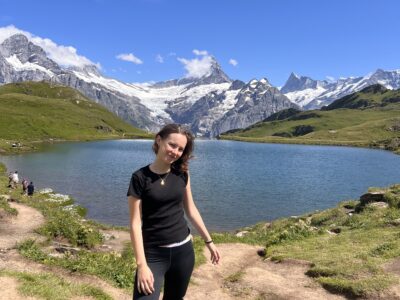By Lin Ye
This spring, students in the Undergraduate Program in Sustainable Development presented innovative solutions to sustainability issues as part of their Capstone Workshop. Under the guidance of professors Stuart Gaffin, Radley Horton and Michael Steckler, students applied the knowledge they gained from the program to analyze and provide recommendations to challenges faced by real world clients. The clients ranged from the United States Military Academy at West Point to the Sabin Center for Climate Change Law. Read more about the projects below.
Strategies for Regional Cooperation in the Nile River Basin

Client: United States Military Academy at West Point
Team members: Declan Devlin, Jose Flores, Coralie Harouni, Alain Jabbour, Teo King, Katja Lazar, Kyul Rhee, Magaly Santillan, and Norman Shafto
United States Correctional Sector Climate Vulnerabilities Assessment
In this project, students worked with client Daniel Holt, a visiting fellow at the Columbia Law School, to address the understudied question: “How will a hotter planet, extreme heat waves, increased severity of storm surges and flooding affect the United States correctional sector?” After thorough research, the team concluded that climate change will indeed affect the correctional sector. They recommended that efforts be taken to educate correctional facility administrators and facilities staff about the potential impacts if no mitigation strategy is put in place, and that more funding be allocated to the correctional sector for climate change adaptation strategies at national, regional, and local levels.
Client: Daniel Holt, Visiting Scholar, Sabin Center for Climate Change Law, Columbia Law School
Team members: Alyssa Menz, Francesca Audia, Tori Gilbert, Azania Umoja, Lanti Moye-McLaren, Diane Jung, and Najin Kim
Environmental Impact Statement Analysis

Client: Sabin Center for Climate Change Law, Columbia Law School
Team members: Paul Ross, Myriam Amri, Mai Uchida, and Nicole Bauer
Analyzing the Correlation between Travel Distance to Fresh Pond Water Sources and Income Expenditure
The goal of this project was to test the hypothesis that household expenses/annual income in the Bengali Sundarbans region in Bangladesh are directly related to travel time to a freshwater pond. Students surveyed 14 villages and 220 households during the semester. They collected 1310 variables to test the hypothesis by using following formula:

The team concluded that, surprisingly, no clear correlation existed between travel time and higher expenses, yet the test yielded statically significant results and a correlation did exist between travel time and higher annual income.
Client: Lamont-Doherty Earth Observatory
Team members: Yassamin Issapour, Dan Louis, and Diana Montoya
Spatiotemporal Mapping of Agricultural Phenology in the Southern Delta of Bangladesh
The agriculture industry represents 15 percent of Bangladesh’s annual GDP and 47 percent of the total labor force (CIA, 2015). In this project, students examined the interaction of riverine processes, hydrology, geology, climate change, culture and sustainable development in the southern delta region of Bangladesh. Students drew conclusions through research questions such as, “Will ground truthing reveal any similarities or differences in what remote sensing models show? And how do these survey data fit into the larger context of agriculture in the Khulna district?” Research methods such as field verification and remote sensing were used during the investigation.
Client: Lamont-Doherty Earth Observatory
Team members: Zhibek Issakyzy, Joelle Boxer, Monica Carty, and Khristopher Nicholas
Analyzing the Correlation between Disaster Preparedness and Community-Level Variables in the Bengali Sundarbans

Students solved the puzzles by using research methods include matching questionnaires, data cleaning, focusing research questions, mapping and developing community profiles.
Client: Professor Michael Steckler, Lamont-Doherty Observatory and Professor Brooke Ackerly, Vanderbilt University
Team members: Noeleen Advani, Miriam Kaplan, and Samantha Schipani
You can watch a video of the presentations online.
Columbia’s Undergraduate Program in Sustainable Development is an interdisciplinary program that addresses sustainable development through an understanding in the interaction between natural and social systems, offered through The Earth Institute in partnership with Columbia College and the School of General Studies. Participating departments and schools of the sustainable development major and special concentration include the Department of Earth and Environmental Biology; the Department of Earth and Environmental Engineering; the School of International and Public Affairs and the Mailman School of Public Health.
To learn more about the Undergraduate Program in Sustainable Development, visit our website or contact Program Manager Jessica Sotomayor at jsotomayor@ei.columbia.edu.
Lin Ye is an intern for the Office of Academic and Research Programs at the Earth Institute, Columbia University. He was a graduate student at Columbia University and graduated in 2015 with a Master of Science degree in Sustainability Management.



